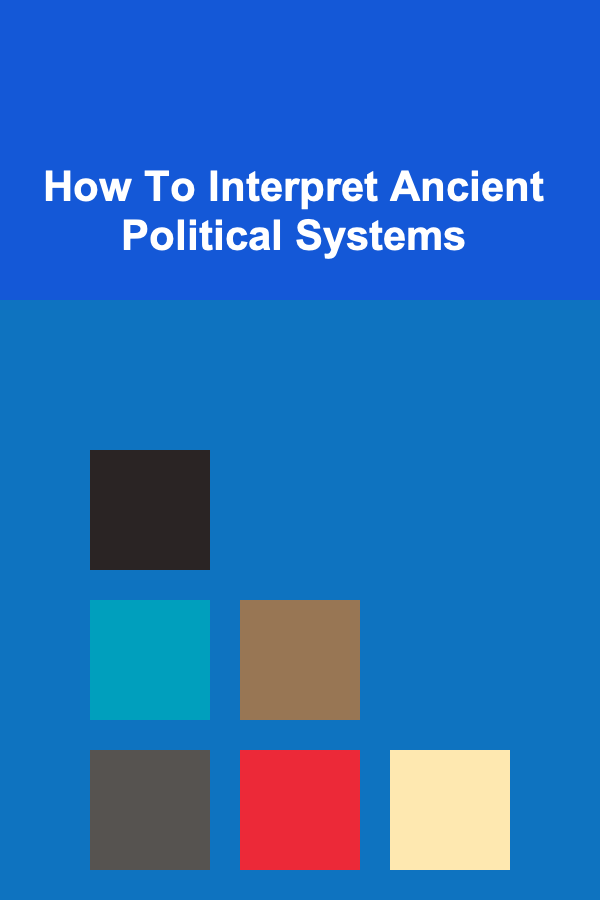
How To Interpret Ancient Political Systems
ebook include PDF & Audio bundle (Micro Guide)
$12.99$5.99
Limited Time Offer! Order within the next:

Interpreting ancient political systems offers us an opportunity to delve into the structures that shaped societies and civilizations millennia ago. Ancient political systems, whether in the form of monarchies, republics, or tribal councils, played critical roles in shaping not only the political landscapes of their time but also the cultural, social, and economic fabric of their civilizations. To fully appreciate these systems, we need to consider the cultural contexts in which they emerged, the power structures they upheld, the roles of governance, and their legacies in modern political systems.
This article explores the ways in which we interpret ancient political systems, the methodologies used by historians and political scientists, and the enduring influence these systems have had on the development of contemporary governance. We will examine key ancient political systems from civilizations such as Mesopotamia, Egypt, Greece, Rome, China, and Mesoamerica, investigating how they functioned and how they are interpreted today.
Understanding the Foundations of Ancient Political Systems
Before delving into specific civilizations, it's important to understand the key elements that constituted ancient political systems. Ancient political systems were shaped by a range of factors, including geography, religion, economic resources, military power, and social structures.
Geography and Environment
The physical environment often played a central role in determining the form of governance. River valleys, such as the Nile, Tigris-Euphrates, and the Indus, were fertile regions that facilitated the rise of centralized political systems. In contrast, regions with harsher climates, such as the steppes of Central Asia, saw the emergence of nomadic tribes with decentralized forms of governance. The availability of resources like fertile land, trade routes, and natural defenses also influenced the political dynamics of a civilization.
Religion and Divine Rule
Religion was often intertwined with political power in ancient societies. Many ancient rulers were considered divine or semi-divine figures, with their authority believed to be sanctioned by the gods. In ancient Egypt, for example, the Pharaoh was seen as a god on earth, and his rule was considered divine. Similarly, in Mesopotamia, kings like Hammurabi were believed to be appointed by the gods to ensure justice and order.
Social Structure and Class Systems
Social hierarchies were integral to ancient political systems. Political authority often rested in the hands of a ruling elite, including kings, nobles, or priestly classes. Below them were the common people, slaves, or serfs. These class distinctions determined not only political participation but also the distribution of wealth and power.
The Role of Military Power
Ancient political systems were also shaped by military considerations. Empires often expanded through conquest, and political legitimacy was often maintained through the threat or use of military force. For instance, the Roman Empire's political structure was significantly influenced by its military needs, and the development of the Roman legions was crucial in maintaining imperial control over vast territories.
Case Studies of Ancient Political Systems
Mesopotamia: Early Monarchical and Theocratic Systems
Mesopotamia, considered the cradle of civilization, is home to some of the earliest known political systems. From the rise of the Sumerian city-states to the Akkadian and Babylonian empires, Mesopotamian politics evolved through a series of stages that combined monarchy with theocratic elements.
Sumerian City-States
The Sumerians established one of the earliest forms of city-state governance. Each city-state, such as Ur, Uruk, and Lagash, was ruled by a "lugal" (king), who held both political and religious power. The lugal was seen as the representative of the gods and was responsible for upholding justice, ensuring the prosperity of the city, and leading in times of war.
Hammurabi and the Babylonian Empire
Perhaps the most famous political figure from Mesopotamia is King Hammurabi of Babylon. His law code, the Code of Hammurabi, is one of the earliest and most complete written legal systems in history. Hammurabi's political system combined centralized royal authority with a theocratic justification of power. He claimed that the gods had given him the authority to rule, which provided divine legitimacy to his actions.
Ancient Egypt: The Pharaoh's Divine Rule
Ancient Egypt provides a striking example of theocratic monarchy, where political and religious leadership were fused into a single figure: the Pharaoh. The Pharaoh was not only the king but also considered a living god, the intermediary between the gods and the people.
Pharaonic Rule and the Concept of Ma'at
The concept of ma'at --- a divine principle of order, justice, and truth --- was central to Egyptian political philosophy. The Pharaoh was responsible for maintaining ma'at, ensuring the proper functioning of society and harmony with the divine order. The political structure was highly centralized, with the Pharaoh at its apex and a large bureaucracy to carry out royal decrees and manage the economy, agriculture, and military.
Ancient Greece: The Birth of Democracy and Philosophical Governance
Ancient Greece is often credited with being the birthplace of democracy, particularly through the political innovations in Athens during the 5th century BCE. The Greek city-states (known as polis) had varying political systems, ranging from monarchy to oligarchy, and in the case of Athens, a radical experiment in direct democracy.
Athenian Democracy
Athenian democracy, as practiced in the 5th century BCE, was a direct form of governance where citizens participated in decision-making directly. Citizens gathered in the ekklesia (assembly) to vote on laws, military campaigns, and other matters of state. However, this system excluded women, slaves, and non-citizens, making it a limited form of democracy by modern standards.
Plato and Aristotle: Philosophical Interpretations of Governance
Philosophers like Plato and Aristotle had profound influences on the interpretation of political systems. Plato's Republic proposed an idealized form of governance led by philosopher-kings, while Aristotle's Politics analyzed different forms of government, including monarchy, aristocracy, and democracy, offering insights into the strengths and weaknesses of each.
The Roman Republic and Empire: Expansion, Governance, and Legacy
The Roman political system evolved from a republic to an imperial monarchy. The Roman Republic (509-27 BCE) was characterized by a complex system of checks and balances, where elected officials shared power. However, as Rome expanded, the political system became increasingly strained, leading to the rise of autocracy under Augustus and the establishment of the Roman Empire.
The Roman Republic
The Roman Republic was an early example of a mixed government, combining elements of democracy, oligarchy, and monarchy. The Senate, composed of patricians (the elite class), had significant control over legislation, while elected magistrates, such as consuls, held executive power. This system was designed to prevent any single individual from accumulating too much power, yet it still relied on military strength and aristocratic dominance.
The Roman Empire and Autocracy
With the rise of Augustus, the Roman political system transitioned from a republic to an empire, where the emperor held supreme authority. Despite the outward appearance of maintaining republican institutions, power was increasingly concentrated in the hands of the emperor. The political systems of the Roman Empire would serve as models for later empires, influencing political structures in Europe, Byzantium, and even beyond.
Ancient China: Dynastic Rule and the Mandate of Heaven
Ancient China's political systems were deeply intertwined with the concept of the Mandate of Heaven, the belief that rulers were divinely chosen to govern but could lose this mandate if they were unjust or failed to maintain order. Chinese dynastic rule was characterized by a centralized bureaucracy and the emperor as the Son of Heaven.
The Qin Dynasty and Legalism
The Qin Dynasty (221-206 BCE), under Emperor Qin Shi Huang, introduced the philosophy of Legalism, which emphasized strict laws and harsh punishments. This approach consolidated power in the hands of the emperor and centralized the state, laying the groundwork for later dynasties such as the Han.
Confucian Governance
Confucianism, which became the state philosophy during the Han Dynasty (206 BCE-220 CE), emphasized moral leadership, the importance of hierarchy, and the duty of rulers to act in the best interests of their people. Confucian principles would shape Chinese governance for centuries, influencing everything from imperial bureaucracy to education.
Mesoamerican Civilizations: The Maya and Aztecs
In the Americas, civilizations like the Maya and the Aztecs developed complex political systems that combined religion with governance. Both societies were characterized by centralized rulers and a strong emphasis on divine legitimacy.
Mayan City-States
The Maya civilization (circa 2000 BCE-1500 CE) was composed of numerous city-states, each ruled by a k'ul ajaw (holy lord), who was both a political and religious leader. These rulers were considered to have a direct connection to the gods and were responsible for maintaining cosmic order through rituals and warfare.
Aztec Empire
The Aztec Empire (1428-1521 CE) was a theocratic empire, with the emperor (Huey Tlatoani) regarded as a divine figure. The political system was highly centralized, and the emperor's authority was reinforced by the tribute system, which required conquered peoples to pay tribute in goods, labor, and human sacrifice.
Methodologies for Interpreting Ancient Political Systems
The interpretation of ancient political systems involves several methodologies, ranging from historical analysis to comparative political theory. Scholars use a range of tools, including written records, archaeological evidence, and the study of material culture, to piece together how ancient political systems functioned.
Historical and Textual Analysis
One of the primary methods for interpreting ancient political systems is through the study of written records. This includes legal codes, royal decrees, inscriptions, and other documents that provide direct evidence of governance. For instance, the Code of Hammurabi and the writings of Greek philosophers like Plato and Aristotle offer valuable insights into ancient political thought.
Archaeological Evidence
Archaeological findings, such as the remains of palaces, temples, and other public buildings, provide important context for understanding the physical structures that supported ancient political systems. The layout of cities, the construction of monumental architecture, and the discovery of burial sites for rulers all reveal how power was symbolized and maintained.
Comparative Analysis
Scholars often use comparative analysis to interpret ancient political systems. By examining different civilizations, we can understand both universal and unique features of governance. For example, comparing the Roman Republic with the Athenian democracy reveals contrasting approaches to citizen participation and the role of elites in governance.
The Legacy of Ancient Political Systems
Ancient political systems laid the foundations for modern governance. Many concepts, such as democracy, citizenship, and the rule of law, have their roots in the political innovations of ancient Greece and Rome. Similarly, the idea of divine kingship in Egypt and Mesopotamia influenced later monarchies in Europe and Asia.
Ancient political systems also shaped modern political ideologies, including republicanism, legalism, and Confucianism. The ongoing study of these systems provides us with a deeper understanding of political power, governance, and justice, offering valuable lessons for contemporary politics.
In conclusion, interpreting ancient political systems involves a multidisciplinary approach that combines history, archaeology, and political theory. By examining the structures, ideologies, and practices of ancient civilizations, we gain valuable insights into the ways that power was organized and exercised. Through this understanding, we can better appreciate the legacies of these systems and their enduring influence on modern political thought and practice.

How to Have a Family Storytelling Night at Home
Read More
How to Save Money on Banking Fees: Tips for Every Account Holder
Read More
Smart Tips for Utilizing Digital Coupons and Stretching Your Budget
Read More
The Power of Partnership: How to Stand Out by Collaborating with Others
Read More
How to Learn Basic Robotics for Fun
Read More
How to Understand the Glycemic Index of Foods
Read MoreOther Products

How to Have a Family Storytelling Night at Home
Read More
How to Save Money on Banking Fees: Tips for Every Account Holder
Read More
Smart Tips for Utilizing Digital Coupons and Stretching Your Budget
Read More
The Power of Partnership: How to Stand Out by Collaborating with Others
Read More
How to Learn Basic Robotics for Fun
Read More